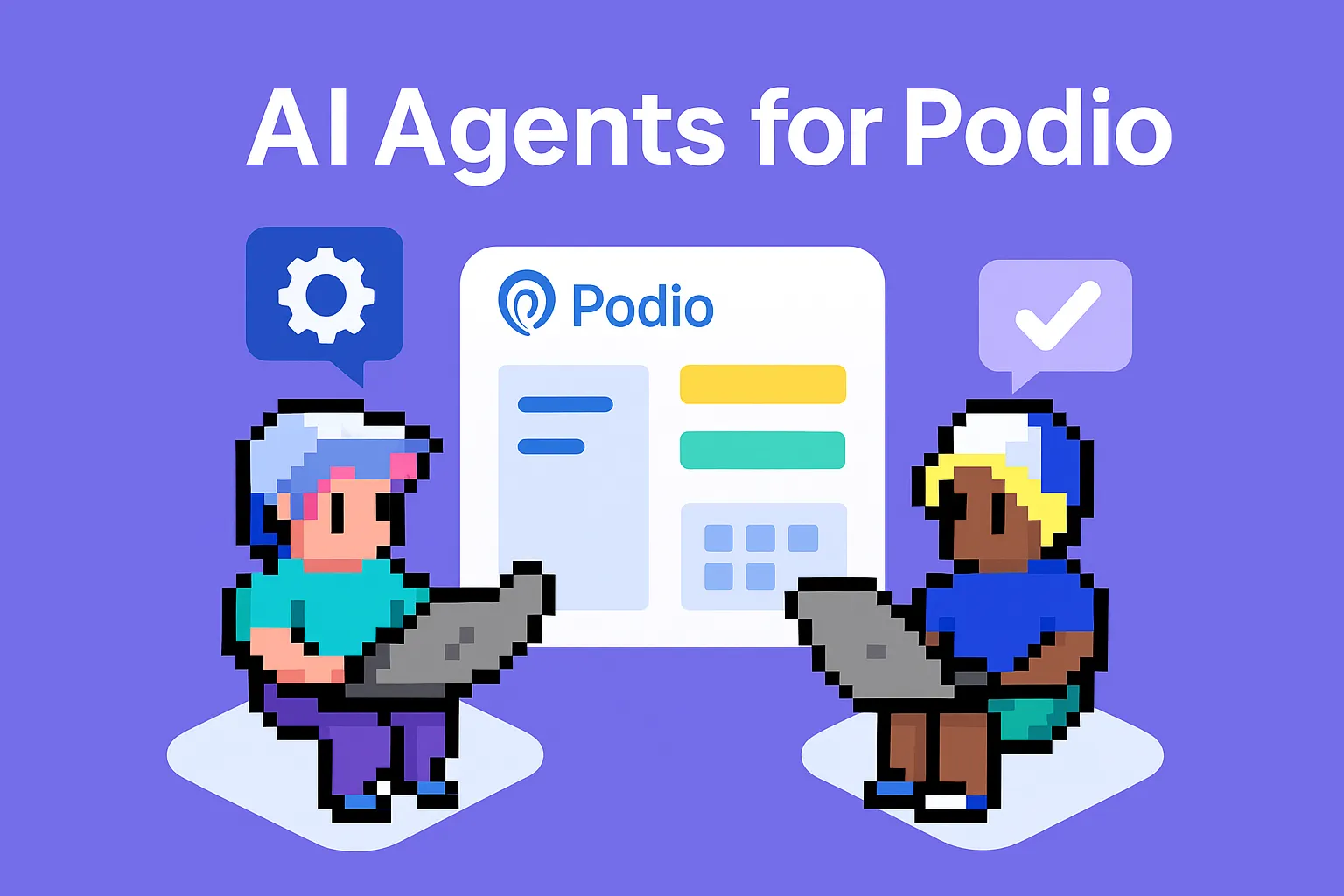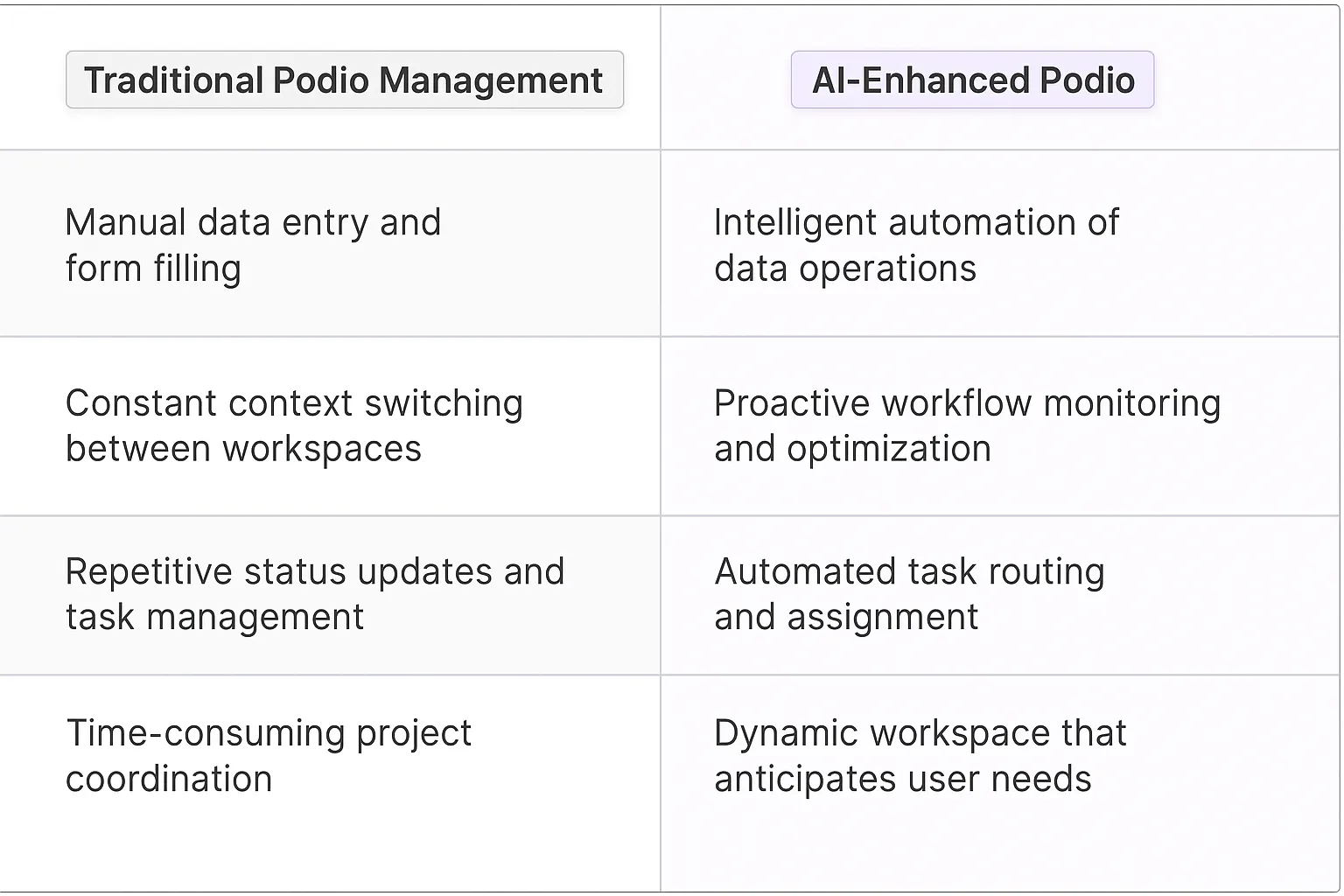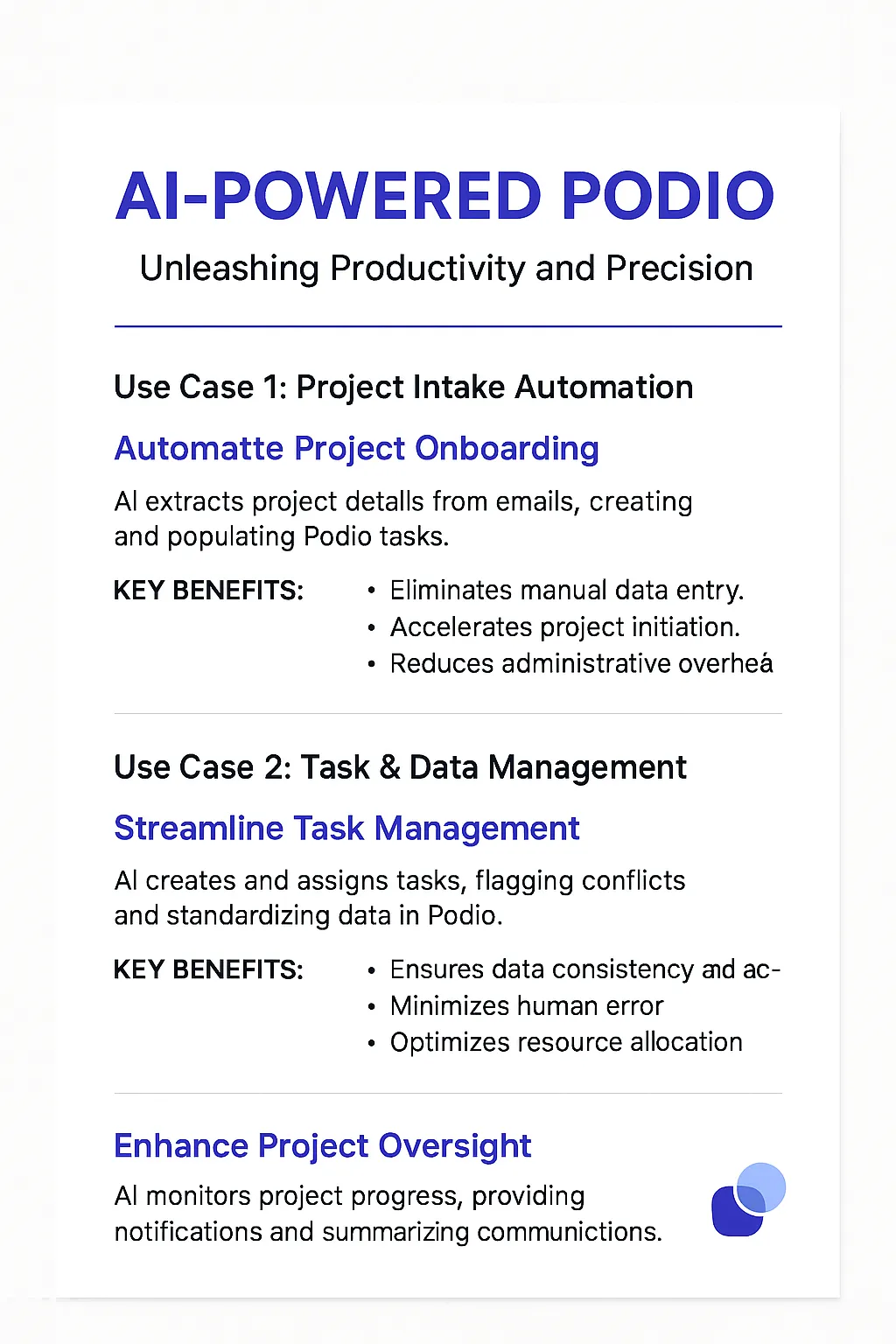Podio
Understanding Podio's Collaborative Workspace Platform
What is Podio?
Podio is a flexible workspace platform that enables teams to create custom apps, manage projects, and organize workflows according to their specific needs. The platform combines social collaboration, structured data management, and process automation in a highly customizable environment. Unlike traditional project management tools, Podio allows organizations to build their own work management solutions without coding.
Key Features of Podio
- Custom app creation for specific business processes
- Granular workspace organization and access controls
- Rich collaboration tools including activity streams and file sharing
- Workflow automation capabilities
- Integration options with external tools and services
- Mobile access for on-the-go team coordination

Benefits of AI Agents for Podio
What would have been used before AI Agents?
Podio users traditionally relied on manual data entry, repetitive form filling, and constant context switching between different workspaces. Teams spent countless hours updating project statuses, moving tasks between stages, and copy-pasting information across different Podio apps. The cognitive load of managing multiple workflows while maintaining data accuracy created significant friction in daily operations.
What are the benefits of AI Agents?
AI Agents transform Podio from a static workspace into a dynamic environment that anticipates and executes user needs. These digital teammates monitor workflow patterns and proactively suggest process automation based on historical data and user behavior.
The network effects in Podio become exponentially more valuable with AI Agents. As teams interact with their digital teammates, the system builds a deep understanding of organizational processes, terminology, and priorities. This knowledge compounds over time, enabling increasingly sophisticated automation and decision support.
AI Agents excel at breaking down complex Podio workflows into manageable components. They can:
- Auto-categorize incoming items and route them to appropriate workspaces
- Extract key information from emails and documents to populate Podio fields
- Monitor project milestones and flag potential bottlenecks before they impact deadlines
- Generate comprehensive reports by analyzing data across multiple Podio apps
- Maintain data consistency by updating related items across different workspaces
The real power emerges when AI Agents handle the cognitive overhead of context switching and data management. This allows teams to focus on strategic thinking and creative problem-solving rather than administrative tasks. The result is a self-organizing system that grows more intelligent and valuable with each interaction.

Potential Use Cases of AI Agents with Podio
Processes
AI agents transform how teams interact with Podio's workspace environment. They monitor project updates, track deliverables, and maintain data accuracy across workspaces without manual intervention. When deadlines approach or milestones shift, these digital teammates proactively notify relevant team members and suggest workflow adjustments.
The agents analyze historical project data within Podio to identify bottlenecks and suggest process improvements. They can automatically categorize and route incoming requests, assign tasks based on team member workload and expertise, and ensure proper documentation across all workspace activities.
Tasks
At the task level, AI agents excel at the detail-oriented work that often consumes valuable team time. They automatically populate Podio cards with relevant information from emails, documents, and other integrated tools. The agents maintain consistency in task management, labels, and dependencies while flagging potential conflicts or duplicates.
When team members update task status, the AI analyzes the changes and triggers appropriate follow-up actions - whether that's notifying stakeholders, updating related tasks, or adjusting project timelines. This creates a self-maintaining system where routine task management happens seamlessly in the background.
Data Management
AI agents serve as intelligent data stewards within Podio. They standardize data entry formats, clean existing records, and merge duplicate entries. The agents can extract key information from unstructured data like emails or documents and organize it into Podio's structured format.
Through pattern recognition, these digital teammates identify trends and anomalies in project data, surfacing insights that help teams make better decisions. They maintain data integrity by validating entries against established rules and flagging potential errors for human review.
Communication
The agents facilitate smoother team communication by monitoring conversations and activities across Podio workspaces. They can summarize long discussion threads, extract action items, and ensure important details don't get lost in the flow of information.
When questions arise about processes or data, the AI agents provide contextual answers based on historical workspace information and established team protocols. This reduces the time spent searching for information and maintains consistent communication practices across the organization.

Industry Use Cases
AI agents within Podio transform how teams operate across multiple sectors, bringing intelligence and automation to this robust project management platform. The integration creates a powerful synergy between human expertise and AI capabilities, fundamentally changing how organizations handle their core processes.
When examining real-world applications, we see AI agents in Podio doing far more than basic task automation. They're actively participating in complex workflows, learning from organizational patterns, and adapting to specific industry needs. This shift from static project management to dynamic, AI-enhanced operations represents a significant evolution in how businesses leverage their Podio workspaces.
The following industry examples demonstrate how AI agents enhance Podio's native capabilities, creating more intelligent and responsive work environments. Each case illustrates unique applications that go beyond standard automation, showing how AI becomes an integral part of teams' daily operations.
Real Estate Teams Unlock Deal Velocity with Podio AI Agents
Real estate professionals face a unique challenge - they need to simultaneously manage property listings, nurture client relationships, coordinate with multiple stakeholders, and stay on top of complex transactions. The traditional approach of manually updating spreadsheets and sending endless follow-up emails creates massive friction in the sales process.
Podio AI Agents transform how real estate teams operate by intelligently automating the heavy lifting across the entire deal lifecycle. When a new lead comes in through a property listing, the AI agent immediately creates a structured client profile, schedules follow-ups, and generates personalized email templates based on the prospect's specific interests and requirements.
During active deals, the AI agent monitors communication threads across buyers, sellers, agents, and other parties, proactively flagging important updates and required actions. It maintains an always-current status dashboard showing where each transaction stands, what documents are still needed, and which stakeholders need to be engaged.
The real game-changer comes from the AI agent's ability to analyze patterns across hundreds of past deals to identify the optimal timing and sequence of activities that lead to successful closings. Real estate teams can now scale their operations without sacrificing the personal touch that builds lasting client relationships.
For example, a boutique real estate firm in Austin implemented Podio AI Agents and saw their average time-to-close decrease by 40% while agents were able to handle 3x more active listings. The AI handled routine tasks like gathering property details, scheduling viewings, and document collection - letting agents focus on high-value client interactions.
This represents a fundamental shift in real estate operations - from reactive and manual to proactive and intelligent. The firms that embrace these digital teammates gain a significant competitive advantage in their ability to deliver exceptional client experiences at scale.
Marketing Agencies Scale Creative Production with Podio AI Agents
Marketing agencies face intense pressure to produce high-quality creative assets while managing complex client relationships and tight deadlines. The traditional agency model breaks under the weight of endless revision cycles, scattered feedback, and manual campaign tracking.
Podio AI Agents fundamentally reshape how agencies operate by bringing intelligence to the creative production process. When clients submit new project briefs, the AI agent analyzes requirements, automatically creates project timelines, and assigns tasks to the right team members based on their skills and current workload.
The AI agent's most powerful capability lies in its understanding of creative workflows. It learns from historical project data to identify bottlenecks, predict potential delays, and suggest process improvements. For creative reviews, it aggregates feedback from multiple stakeholders into actionable items, maintaining version control and ensuring nothing falls through the cracks.
A mid-sized agency in Chicago implemented Podio AI Agents across their content production teams and uncovered fascinating results. Their creative directors saved 15 hours per week previously spent on project coordination. The AI tracked version histories, managed asset libraries, and maintained clear communication channels between designers, copywriters, and account managers.
The system's pattern recognition capabilities proved particularly valuable for campaign optimization. By analyzing performance data across hundreds of past campaigns, the AI agent identified winning creative approaches for different client verticals and audience segments. This led to a 60% reduction in revision cycles and a 35% increase in client satisfaction scores.
Beyond operational efficiency, the AI agent transforms client relationships by maintaining detailed interaction histories and proactively surfacing relevant insights during client meetings. Account managers walk into every conversation armed with data-driven recommendations and clear progress metrics.
The marketing agencies that thrive in the next decade will be those that successfully blend human creativity with AI-powered operations. These digital teammates don't replace human judgment - they amplify it by handling the cognitive overhead of project management and letting creatives focus on what they do best.
Considerations and Challenges
Implementing AI agents within Podio requires careful planning and strategic consideration across multiple dimensions. The integration complexity stems from Podio's unique workspace structure and customizable workflows.
Technical Challenges
Data access patterns present the first major hurdle. Podio's hierarchical organization of workspaces, apps, and items creates intricate permission structures that AI agents must navigate. The agent needs granular access controls while maintaining data access security boundaries.
API rate limiting poses another technical constraint. Podio's API throttling means agents must implement smart caching and request batching. Without proper optimization, agents can hit usage limits during peak periods, disrupting critical workflows.
Custom field types in Podio apps require specialized handling. While standard fields like text and numbers are straightforward, category fields, relationships, and calculated fields need careful mapping to maintain data integrity when the agent interacts with them.
Operational Challenges
Training requirements vary significantly based on workspace configuration. Each organization structures Podio differently, meaning agents need adaptation periods to learn specific business processes, terminology, and workflow patterns.
Change management becomes crucial when introducing AI agents. Teams often develop ingrained habits around Podio workflows. The transition requires clear communication about the agent's capabilities and limitations to set realistic expectations.
Monitoring and maintenance demand ongoing attention. Agents need regular performance reviews to ensure they're correctly handling edge cases and evolving business rules. Updates to Podio's platform may also require agent adjustments to maintain functionality.
Cost considerations extend beyond initial implementation. While AI agents can boost productivity, organizations must weigh ongoing operational costs against efficiency gains. This includes API usage fees, maintenance resources, and potential need for specialized expertise.
Transformative Impact of AI-Enhanced Workspace Management
The integration of AI Agents with Podio marks a significant evolution in workspace management. Organizations that successfully implement these digital teammates gain compound advantages through improved data quality, reduced cognitive overhead, and more intelligent process optimization. While challenges exist in implementation and maintenance, the transformative impact on team productivity and decision-making capabilities makes this a critical consideration for forward-thinking organizations.
The key to success lies in viewing AI Agents not as mere automation tools, but as evolving digital teammates that enhance human capabilities. As these systems continue to learn and adapt, their value to organizations grows exponentially, creating sustainable competitive advantages through more intelligent workspace operations.













